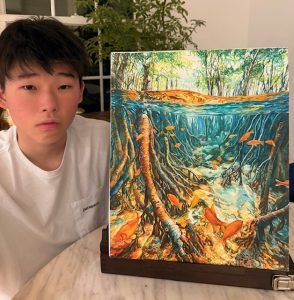AI-Generated Content in Creative Industries: The Ethical Concerns
June 1, 2023
As artificial intelligence continues to advance, new uses for it are being discovered that could significantly change the way creative industries operate. Particularly, one of these uses is known as generative AI, which, as described by IBM: “It refers to deep-learning models that can generate high-quality text, images, and other content based on the data they were trained on.”
The use of generative AI can bring about positive change, allowing users to reach new creative potentials only possible with advanced technology. However, just as the rise of AI chat bots such as ChatGPT brought with it questions about where limits on AI should be placed, AI-generated content becoming a part of mainstream culture raises its own ethical concerns that are important for both users and developers to consider.
On the social media app TikTok, it is a current trend to use AI to mimic the voice of popular singers, allowing users to hear what it would be like if their favorite singer did a cover of a song by another artist. Popular examples of TikToks of this nature that have gone viral include videos of an AI replicating Kanye West’s voice covering songs by Adele and Ariana Grande.
A song titled “Heart On My Sleeve” was created and uploaded to TikTok by user ghostwriter977 and used AI to make it sound as though it was sung by popular artists Drake and the Weeknd. An article from dot.LA states the video surpassed 15 million views on TikTok and was later streamed more than 600,000 times. The song was not completely created by an AI; the beat and lyrics of the song were all created and recorded by a human. AI was only used to make the vocals of the creator sound like the vocals of Drake and The Weeknd.
Despite this, the video was taken down from TikTok and all other music streaming platforms by Universal Music Group (UMG). According to an article from NPR, UMG released a statement saying that using the works of artists to train AI technology, such as the one used to create “Heart On My Sleeve,” is a violation of copyright law. Alongside this, though the song itself was completely original, many argue that using AI for music production in this manner could be detrimental to the artists whose voices are being replicated. An important question to consider is who deserves to receive profit for AI-generated music made to sound like a certain artist.
This issue extends beyond just the music industry and also to industries such as fashion and art. Similar to the situation with “Heart On My Sleeve,” there are concerns about the use of copyrighted artwork in databases used to train AI models.
An article from Guardian states that these databases used by generative AI programs used by popular companies such as Midjourney and Stability AI are often created by collecting billions of pictures off the Internet, without obtaining consent from the original artist.

Another ethical question that is up for debate is whether an AI should be able to flawlessly copy the style of another artist without their permission. Many artists believe that the answer to that question is no, such as illustrator Anoosha Syed, who gave a statement to Guardian saying that AI using reference pictures from an artist is no different from a human mimicking the style of an artist and then passing it off as their own.
A main issue with the use of AI in creative industries is the loss of human expression and emotion, which, to many, is what makes art truly “art.” Likewise, the fact that AI is trained on existing trends and data sets could result in a decline in quality or uniqueness of AI-generated products.
For many people, this lack of human creativity and expression in AI art is what deters them from supporting such work. “I think it’s interesting to see what AI can generate when given a specific prompt or concept to work with, but I think the importance of things like art and literature come from the fact that they are human-made and prone to flaws,” Eftihia Christou, a junior in AVPA-V, stated. “There’s a lack of passion and heart that I don’t think I would be able to support in the long run.”
The amount of support given to AI-generated work largely depends on the individual’s own preferences and beliefs about where lines should be drawn. “I think I would buy AI-designed clothes and listen to AI-replicated music if it was created to replicate the artists I like,” Isabella Martinez, a junior in AEDT, said. “I don’t think I would buy art designed by AI because art is created to express emotion and I can’t see myself purchasing AI art that I know has no emotion or human connection.”
While advancements in technology, such as those in the field of artificial intelligence, are generally regarded as beneficial for their potential to improve existing systems and create new solutions, it is important to reflect on whether these technologies are fair, usable, and beneficial to everyone.




